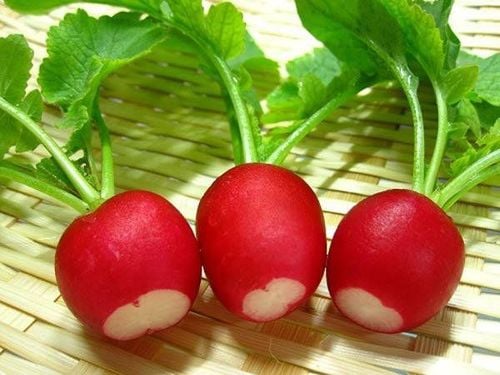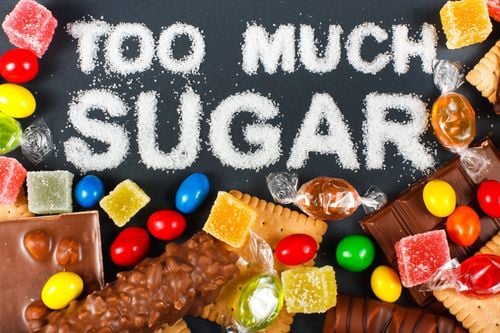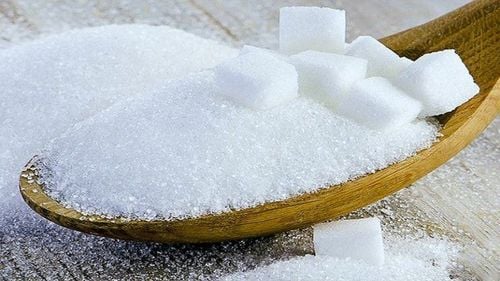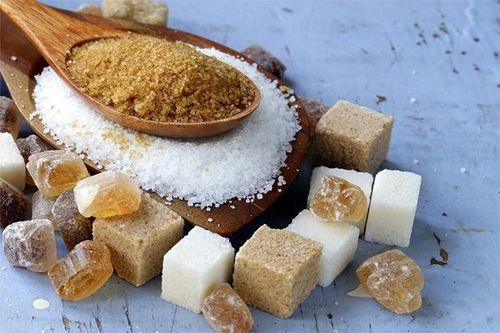This is an automatically translated article.
Both beet sugar and cane sugar are found in many processed foods, including sweets, processed foods, baked goods and soft drinks. However, there are some characteristics that set these two popular sugars apart. This article provides more information on the difference between beet and cane sugar to determine which is healthier.
1. What is beet sugar?
Beet sugar is derived from the beet plant, a root vegetable that is closely related to the beet and beet leaves.
Along with sugar cane and cane sugar products, sugar beet is considered as one of the most common crops used to produce white sugar.
In addition, beets are also used to produce other refined sugars, such as molasses and brown sugar.
However, because the source of sugar is not always stated on food product and nutrition information labels, it is difficult to determine the sugar content of foods containing beet or cane sugar. or not.

Củ cải đường là một trong những loại cây phổ biến để sản xuất đường trắng
2. Difference in production of beet sugar and cane sugar
One of the biggest differences between beet sugar and cane sugar is based on their processing and manufacturing methods. Sugar from beets is produced by a process that includes steps such as slicing the beets to extract the natural sugar juice. The juice is filtered and heated to produce a concentrated syrup, which is then crystallized to form granulated sugar.
Cane sugar is produced in a similar way to sugar beet production but is sometimes processed using bone coal, an ingredient made by heating animal bones. Bone charcoal helps to bleach and filter pure cane sugar to create beautiful colors for white cane sugar.
Although bone char is not found in the end product of cane sugar, people who want to reduce their intake of foods made with animal products, such as vegans or vegetarians, may want to consider this.
In addition, in the production of cane sugar can also be used other products such as activated carbon from coal, which is often used in the processing of white sugar as a vegan substitute. for bone coal.
3. Works differently in recipes between beet sugar and cane sugar
Although cane sugar and beet sugar are nutritionally similar, they may behave differently in recipes. The difference can be partly explained by the distinct difference in taste, which in turn can alter the taste of your dish.
Beet sugar has an earthy, oxidized aroma and a faint burnt aftertaste, while cane sugar is characterized by a sweeter aftertaste and more fruity aromas.
Furthermore, some chefs and bakers using cane and beet sugar have shown that different types of sugar alter the texture and appearance of the finished product in some recipes. Most notably, cane sugar is known to caramelize more readily and produce a more uniform product with a more eye-catching and beautiful color than beet sugar. On the other hand, beet sugar can impart a crunchier texture to products using it and has a unique flavor that goes well with some baked goods.
4. Nutritional composition of cane sugar and beet sugar
There may be some difference between cane sugar and beet sugar, but nutritionally the two are almost identical. Regardless of the origin, refined sugar will essentially be composed of pure sucrose, a compound composed of the molecules of glucose and fructose. Consuming large amounts of manufactured and finished sugar beet or cane sugar can contribute to weight gain and the development of chronic diseases, such as diabetes, cardiovascular disease, and other diseases. liver problems.
Health organizations, such as the American Heart Association, recommend limiting added sugars to less than 6 teaspoons or 24 grams per day for women and less than 9 teaspoons respectively. with 36 grams per day for men. All forms of cane and beet sugar, including white, brown, molasses, turbinado and sugar, are found in many processed foods such as sweets, soft drinks, and desserts.

Khi tiêu thụ một lượng lớn đường củ cải hoặc đường mía cơ thể bạn có thể gặp phải các bệnh liên quan đến tim mạch
5. Genetic variation of beet sugar and cane sugar
Many consumers prefer cane sugar over beet sugar due to concerns about genetically modified (GMO) foods. In the United States, it is estimated that about 95% of beets are produced in the genetically modified form. However, genetically modified cane sugar was approved in the United States in 2018.
Some advocate the implementation and use of genetically modified crops as a sustainable food source that is resistant to pests. bugs, herbicides or extreme weather. Meanwhile, others prefer to avoid using GMO foods due to concerns about possible adverse effects on health or the environment.
Although some researchers worry that some GMO food products may have adverse health effects, research on their effects on humans is still limited.
In addition, other studies have observed that humans can safely eat GMO food products and that they contain the same nutritional profile as conventional crops.
If you are concerned about GMO crops and food products, it is best to choose non-GMO cane or beet sugar to help minimize your exposure to GMO food products.
The aroma and sweetness of beet sugar and cane sugar may vary and may behave differently in cooking and baking. Unlike cane sugar, beet sugar is produced without the bones, which can be important for vegetarians or vegans. However, some people may prefer to use the sweetness of cane sugar, as it is less likely to be genetically modified. That said, both beet sugar and cane sugar have ingredients that include sucrose, which can be harmful to your health when consumed in excess. Therefore, although there may be a difference between these two forms of sugar, you should limit your intake of either type as part of a healthy diet.
Please dial HOTLINE for more information or register for an appointment HERE. Download MyVinmec app to make appointments faster and to manage your bookings easily.
Reference source: healthline.com












